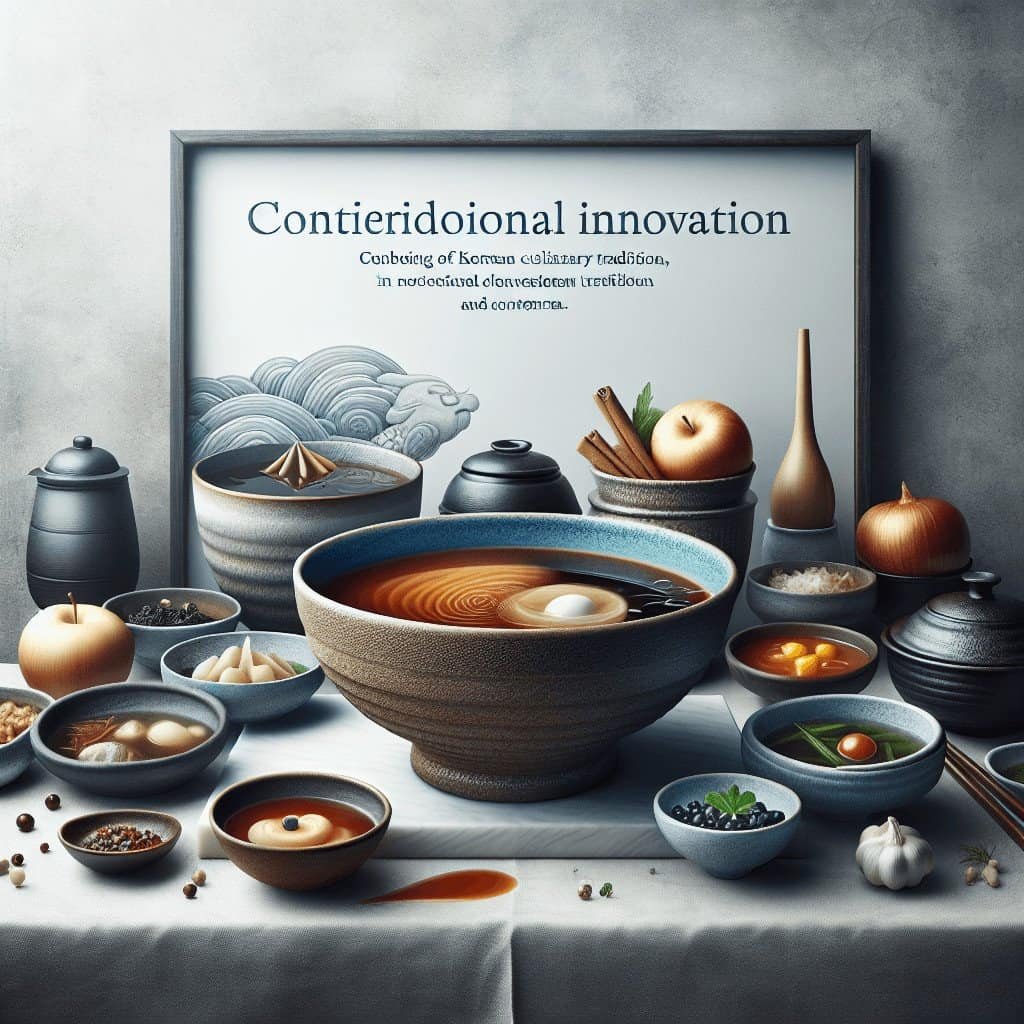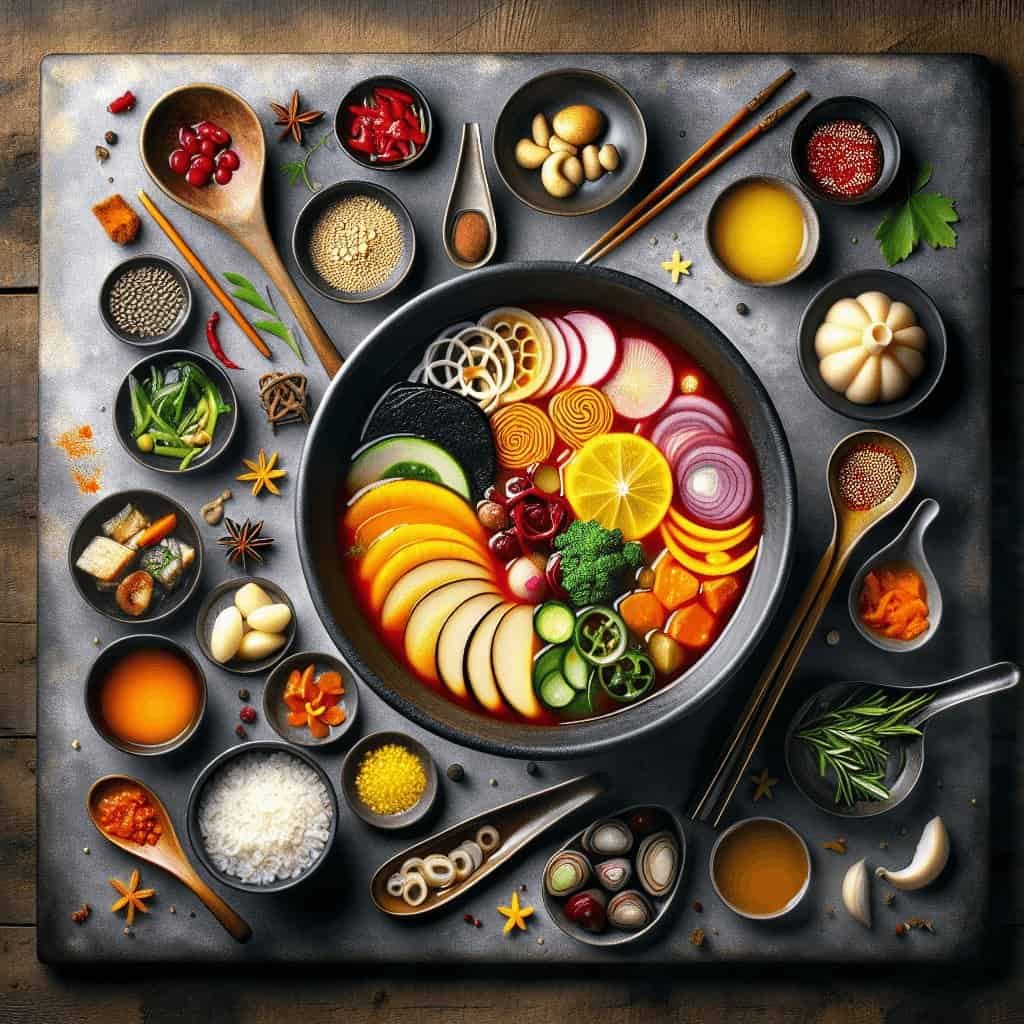Imagine yourself sitting in a cozy, dimly-lit restaurant, filled with the savory aroma of simmering soups. As you peruse the menu, your eyes widen in anticipation, as you discover a new trend that has taken the culinary world by storm – chefs incorporating Korean flavors into non-traditional soups and broths. It’s a tantalizing fusion of traditional Korean spices and ingredients with unexpected culinary combinations, resulting in a symphony of flavors that will surely ignite your taste buds. From hearty stews infused with gochujang, to velvety broths enriched with doenjang, the possibilities are endless. Get ready to embark on a culinary adventure like no other, as we explore how these innovative chefs are revolutionizing the soup game.
Incorporating Korean Flavors into Non-traditional Soups and Broths

Introduction to Korean Flavors
Korean cuisine is known for its bold and complex flavors, which are a result of the country’s rich culinary history and diverse range of ingredients. Korean flavors are characterized by their spiciness, umami, and the use of fermented ingredients. By incorporating these unique flavors into non-traditional soups and broths, chefs are able to create innovative and exciting dishes that appeal to a wide range of palates.
Trend of Fusion Cuisine
In recent years, fusion cuisine has become increasingly popular as chefs seek to create new and exciting flavor combinations. Fusion cuisine combines elements from different culinary traditions to create dishes that are both familiar and unexpected. Korean flavors have become a popular choice for fusion cuisine, as their unique profiles can provide a refreshing twist to traditional dishes.

Influence of Korean Cuisine
Korean cuisine has gained global recognition in recent years, thanks in part to the popularity of Korean dramas and K-pop. This increased exposure has led to a greater interest in Korean flavors and ingredients. Chefs around the world have embraced Korean cuisine and are incorporating its flavors into their own creations. Non-traditional soups and broths are no exception, with Korean flavors adding depth and complexity to these dishes.
Creative Use of Korean Ingredients
One of the ways chefs incorporate Korean flavors into non-traditional soups and broths is by using lesser-known Korean ingredients. Ingredients like gochujang (Korean chili paste), doenjang (Korean fermented soybean paste), and gochugaru (Korean chili flakes) can add a unique kick to soups and broths. By incorporating these ingredients in non-traditional ways, chefs are able to create stunning flavor combinations that surprise and delight.

Experimenting with Korean Seasonings
Korean seasonings, such as gochujang, doenjang, and ganjang (Korean soy sauce), are staple ingredients in Korean cuisine. These seasonings are rich in flavor and can elevate the taste of soups and broths. Chefs often experiment with these seasonings by using them as a base for their broth or as a marinade for the meats and vegetables used in the soup. The result is a bold and flavorful dish that showcases the best of Korean flavors.
Using Korean Vegetables and Herbs
Korean cuisine has a wide variety of vegetables and herbs that can add depth and freshness to soups and broths. From the spicy kick of Korean radishes (mu) to the aromatic goodness of Korean perilla leaves (ggaennip), chefs are incorporating these ingredients into their non-traditional dishes. By highlighting these Korean vegetables and herbs, chefs are able to create unique flavor profiles that are both comforting and exciting.

Adding Korean Fermented Ingredients
Korean cuisine is famous for its fermented ingredients, which add a unique tang and depth of flavor. Chefs are incorporating these fermented ingredients, such as kimchi and doenjang, into non-traditional Korean soups and broths. Kimchi, with its spicy and sour notes, adds a vibrant kick to soups, while doenjang brings a rich umami flavor. By adding these fermented ingredients, chefs are able to create complex and unforgettable dishes.
Exploring Korean Noodle Soups
Korean cuisine is also known for its delicious noodle soups, such as ramyeon (instant noodles) and janchi guksu (traditional Korean noodle soup). Chefs are incorporating Korean noodles into non-traditional soups, creating fusion dishes that combine the comfort of noodles with the bold flavors of Korean cuisine. These noodle soups are often packed with vegetables, meats, and a variety of seasonings, resulting in hearty and satisfying meals.

Incorporating Korean BBQ Flavors
Korean BBQ is beloved worldwide for its flavorful grilled meats and vibrant marinades. Chefs are incorporating these BBQ flavors into non-traditional soups and broths, infusing them with smoky and savory notes. By using Korean BBQ flavors as a base, chefs are able to create dishes that are both comforting and unique, combining the best of Korean cuisine with the warmth of soups and broths.
Adapting Traditional Korean Soups
Another way chefs incorporate Korean flavors into non-traditional soups and broths is by adapting traditional Korean soup recipes. By using traditional Korean soups as a base, chefs can add non-traditional ingredients to create exciting and innovative dishes. Infusing Korean flavors into popular non-Korean soup varieties can create a fusion of tastes that is both unexpected and delightful.
In conclusion, incorporating Korean flavors into non-traditional soups and broths is a trend that is gaining popularity among chefs. By using unique ingredients, experimenting with traditional seasonings, and exploring Korean noodles and fermentation, chefs are able to create innovative and delicious dishes that showcase the best of Korean cuisine. Whether it’s through fusion cuisine or by adapting traditional Korean soups, these dishes are sure to delight and excite diners with their complex flavors and exciting combinations. So next time you’re looking for a unique and flavorful soup or broth, don’t hesitate to try an dish inspired by Korean cuisine!
